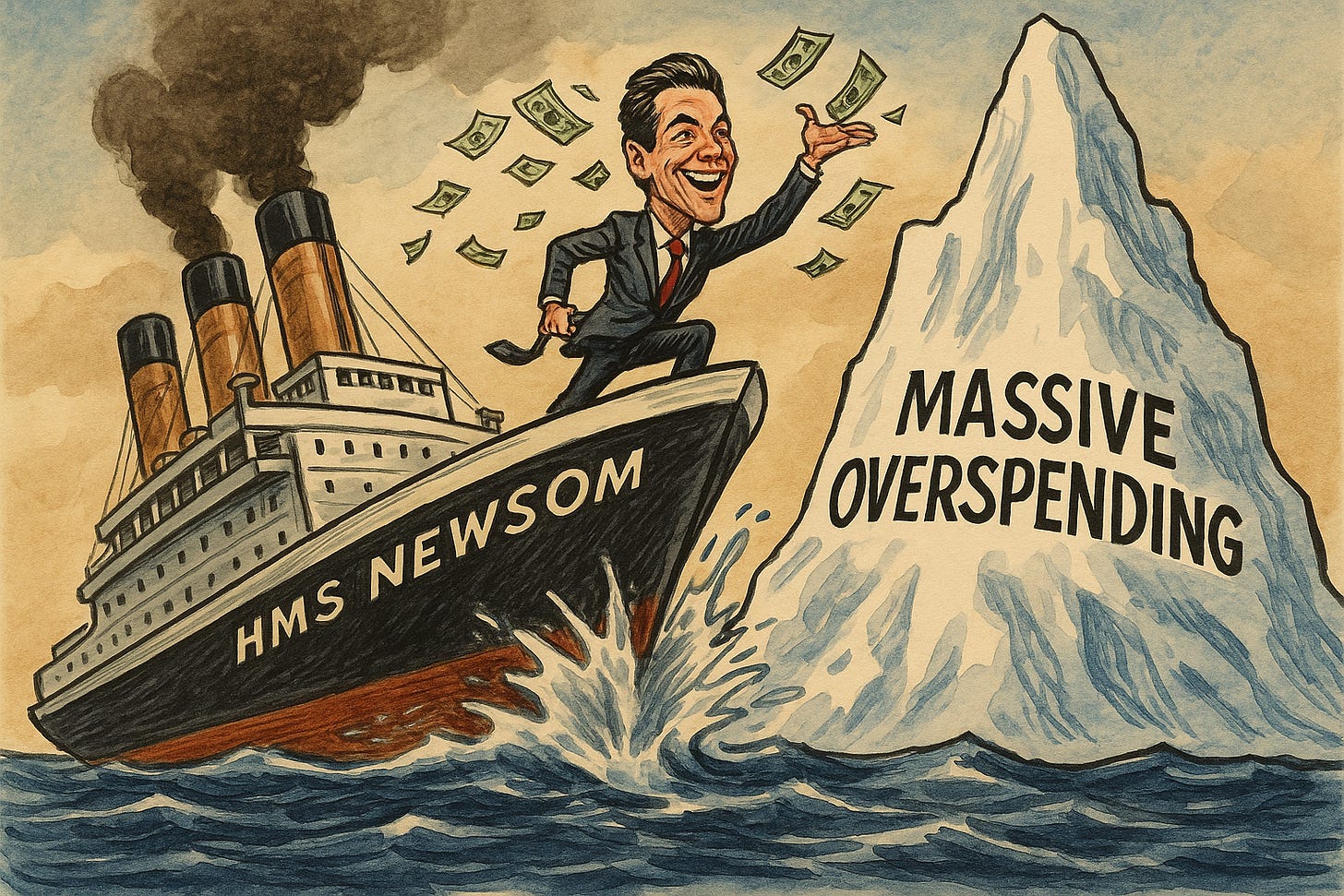California Faces a Massive Budget Shortfall — Because Newsom Can’t Stop Spending
The Legislative Analyst’s official new forecast shows the inevitable result of one-party rule and an administration allergic to fiscal discipline - $35 billion in annual structural deficits for years!
Our afternoon content is typically for our paid subscribers, but occasionally we publish without the paywall so our thousands of free subscribers can see what they are missing out on!
⏱️ 6 Min Read
The Warning Signs Were Always There
California is sliding into one of the worst long-term budget holes the state has ever faced — and it didn’t happen by accident or because “both sides” stumbled into bad decisions. One team in Sacramento marched us straight into this mess.
The nonpartisan Legislative Analyst’s Office (LAO) now projects annual deficits of roughly $35 billion starting in 2027–28 in a scathing new report — a crisis created entirely under uninterrupted Democratic control.
Democrats hold every partisan statewide office and command supermajorities in both chambers. They write the budget, negotiate the budget, and pass the budget. And they do it while systematically shutting Republicans out of meaningful fiscal decision-making. What we are dealing with is not the product of bipartisan compromise; it’s the predictable outcome of one-party rule.
At the center of it is Governor Gavin Newsom. His administration brushed off warnings and kept layering on permanent commitments, acting as if high-revenue years would last forever.
A Spending Model Built on Hope, Not Math
For years, Newsom touted oversized surpluses as proof his policies were working. But those surpluses were built on capital-gains windfalls — the single most volatile revenue source in the entire tax structure. Instead of setting that money aside, Newsom treated it like a blank check and used it to super-size state government in ways taxpayers will be dealing with for decades.
One of the most expensive decisions was Newsom’s push to extend full, taxpayer-funded Medi-Cal to illegal aliens of all ages who meet income rules. This expansion relied on unrealistic estimates. Costs quickly exceeded projections, and payments for this coverage are now locked permanently into the budget.
And that was just one category. Under Newsom, California poured billions more into homelessness programs with little measurable improvement; expanded social-service promises without a long-term funding plan and grew the public-sector payroll while adding costly environmental mandates. On top of that, the state created new entitlement-style programs launched during the peak revenue surge — commitments designed as if California’s flush years would never end. State spending overall has exploded, climbing by tens of billions of dollars in just a few years.
California’s tax base has always been volatile. It shoots upward when the stock market surges and plunges when the market cools - due to an over-reliance on taxing the state’s wealthiest residents. Sacramento’s response has been simple: spend anyway — and make it permanent.
One Party Spent the Money. One Party Owns the Shortfall.
None of this should surprise anyone. This is exactly what happens when legislators lock in permanent spending during temporary high-revenue years and then scramble for excuses when the bill arrives.
And the situation is made worse by Sacramento’s deliberate exclusion of dissenting voices. Republicans aren’t in the negotiations, aren’t in the budget rooms, and aren’t shaping the fiscal blueprint of the state. They may attend hearings, but they have no influence over the state’s fiscal direction.
Democrats designed this budget. They expanded these entitlements. They approved the long-term commitments. The shortfall isn’t mysterious — it’s the direct result of decisions made by the people who held all the power. And Gavin Newsom didn’t just sign these budgets — he pushed for them.
So, Does It Matter?
This matters because ordinary Californians will pay the price: higher taxes, squeezed services, and a state weighed down by debt and costly promises that never should have been made.
And there’s a larger issue. Gavin Newsom clearly has ambitions beyond Sacramento. With the United States already carrying about $38 trillion in national debt, voters are going to have to confront a simple, unavoidable question:
If California couldn’t survive Newsom’s super-big spending, why would the country gamble on the same experiment?




Newsom wants the white house so he can bail out California with Federal taxpayer dollars..
After all he says California is a donor state. He feels entitled to claw back some money from Red States to allow California Dreaming to continue float along on wishing and hoping and praying Gavin goes to Washington and stuff the holey budget with DC cash.